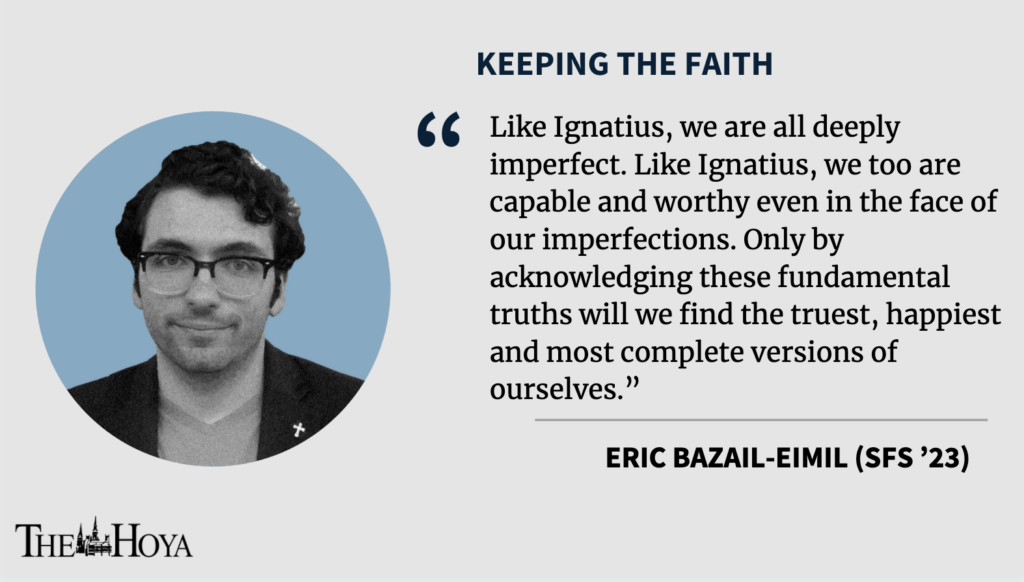In his poem “Pied Beauty,” the English poet and Jesuit Gerard Manley Hopkins, S.J., thanks God for what Hopkins describes as “dappled things:” brinded cows, finches’ wings and trout with red blemishes, among other imperfect specimens that populate the world. According to Hopkins, imperfection is not something we should categorically reject or repair. Instead, we ought to celebrate the perfection latent in the world’s imperfections and the abundant beauty that overflows from the world’s flaws.
Just like the trout, finches and cows of Hopkins’ poetry, humans are dappled things. We each come with notable limitations, and we often fall short, even when failure is of little option. And we come with flaws: grating personality traits as well as penchants for gossip, jealousy, greed, tempers and egos that flare up.
Imperfection is a foundational truth of human existence, yet it is a difficult one to accept. We compare ourselves constantly to one another, inculcated from birth to always be “keeping up with the Joneses,” always buying the latest products and trying to materially outdo our neighbors. Our society fundamentally perpetuates a culture of unsustainable perfection.
Often unintentionally, we extend these material and aesthetic values to our own pursuits of happiness. It’s a tendency I’ve reflected on as the church enters Lent, a period of renewal and repentance in the hopes of deepening and repairing relationships with God. Our society treasures self-perfection, believing that when we become idealized versions of ourselves, we will overcome our past pains and achieve lasting happiness. In reality, finding meaningful happiness depends on our recognition that we will never be entirely perfect; it requires us to reject unhealthy and unsustainable cultures of perfection.
Let me be clear: Complacency in our shortcomings is not a panacea for our problems. Racism, misogyny, homophobia, ableism, xenophobia, classism, antisemitism, Islamophobia and other forms of bigotry and prejudice are inexcusable. Humans are blessed with a powerful capacity to learn, and we should readily take the opportunity to educate ourselves and become more loving neighbors to those around us. But as we learn and grow, we must recognize we will never fully be perfect and correct all of our flaws.
We are confronted with demands for perfection everywhere, especially at Georgetown University. The pressures of the job market, the demands of academic rigor and the challenges associated with fitting in all contribute to the feeling that success requires absolute perfection.
Perhaps unsurprisingly, these demands manifest themselves most overtly on social media. From Instagram destination pictures, to beautiful, airbrushed family photos on Facebook and Twitter and LinkedIn job updates, social media overwhelms us with content that makes others seem more worldly, more successful, more attractive and ultimately more perfect. As a 2019 study in the Journal of the American Medical Association notes, a one-hour increase in average social media usage can significantly elevate symptoms associated with depression. We know social media presents exaggerated successes and only a fragment of people’s lives. Nevertheless, we compare ourselves to others to the detriment of our own happiness. We obsess over our faults and doubt our worthiness for love and compassion, both human and divine.
In the Gospels, Jesus calls on us to be perfect, but Scripture suggests perfection is a difficult state to maintain, if we ever achieve it. In Ecclesiastes, we are reminded that “surely there is not a righteous man on earth who does good and never sins.” Ecclesiastes 7:20. Saint Paul repeatedly reminds Christians in his letters that we are saved not by our earthly works, but by the mercy and forgiveness bestowed upon us through Jesus’ passion on the cross. As he writes in Romans, “but God shows his love for us in that while we were still sinners, Christ died for us.” Romans 5:8. Indeed, salvation and worthiness have never been incumbent upon our perfection.
Saint Ignatius of Loyola, founder of the Society of Jesus, exemplifies this. In his own words, Ignatius described himself before his calling from God as “a man given to the vanities of the world, whose chief delight consisted in martial exercises, with a great and vain desire to win renown.” He was a womanizer who chased glory and fame in the Spanish royal courts and was once arrested after a nighttime brawl. But his call to holiness came as he recovered from a near-fatal cannonball injury he suffered at the Battle of Pamplona. As he convalesced in bed, God pushed him to go out into the world and preach, leading to the creation of the Jesuits and later Georgetown itself.
Ignatius sinned before he answered the call to holiness, and he sinned well after he embarked on holy life. Nevertheless, he was worthy to answer the call to holiness, worthy to be loved and worthy to be saved. Out of his dappled qualities flowed great potential, and in the face of his imperfections, so many found inspiration to serve the world. Imperfection did not prevent him from becoming the best version of himself.
Like Ignatius, we are all deeply imperfect. Like Ignatius, we too are capable and worthy even in the face of our imperfections. Only by acknowledging these fundamental truths will we find the truest, happiest and most complete versions of ourselves.
Eric Bazail-Eimil is a sophomore in the School of Foreign Service. Keeping the Faith appears online every other Friday.









